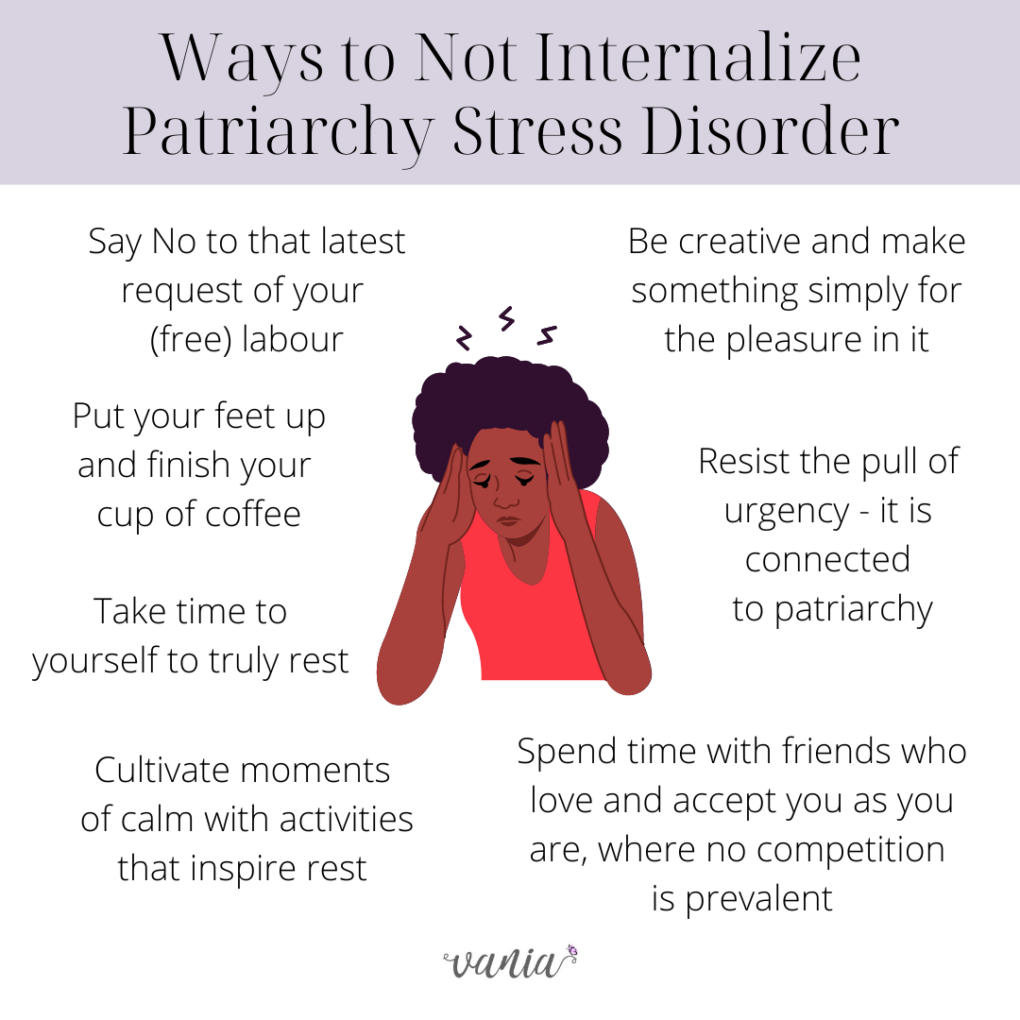Recently, the American Surgeon General shared 2 different research findings that really got my attention. I might be Canadian, but i know our neighbours are not alone in this reality. The most recent one was about parental stress, and last year, research showed that the amount of people experiencing loneliness has reached epidemic proportions.
It’s hard to not notice how both of these very separate results can actually be linked.
I’m going to add a third reality: Internalized toxic productivity that is linked to patriarchy and capitalism. Many women today are their Father’s Daughter, a term coined by Marian Woodman. Not sure what this means? It’s when we internalize the belief that work defines your worth. We internalize the belief also that women are weak, and so we didn’t want to become our mothers. This is the ultimate lie that patriarchy wants us to believe. And guess what? There’s a name for that too: Patriarchy Stress Disorder.
I know i had subconsciously internalized this for years. Throughout my teens and twenties, i moved away from home because i held a belief that staying home meant i would catch the disease of domesticity and become a subservient woman. And then, luckily, in my thirties, i met my shadow and confronted that falsehood.
We need to evolve past the masculine-identified hyper independence of the Artemis archetype to instead embrace the knowing of Aphrodite – our pleasure is our birthright. They may be both maiden goddesses, and yet when we can catch this earlier in life, our spiral path will be greatly altered.
We need to attach our body back to our mind. We are not in fact, walking brains. We are a full human whose soul’s code has already pre-determined our life. Patriarchy and capitalism just wants us to forget this, so that we continue following a groundhog daily grind of life.
We need to trust that we are not a personal development project that always need to be worked on. We don’t need to go on that $2000 retreat to experience an awakening. Coming back to the landscape of our own body and soul’s calling can be the wake-up call. There is nothing to integrate or process.
As Sophie Strand so eloquently puts it, we need to look at our own bodies and reclaim it as a ‘ecodelic.’ It is not about all the supplements to take or the self-care practices to perform. Rather, what about placing your body somewhere on earth, in nature, and be present with your own self. We are our own medicine
We already have what we need.
Lisa Feldman Barrett has a great analogy on how to take care of our energy tanks. She uses the concept of listening to our own body’s message (called interoception) to help us attune to our body’s energy level. She calls this practice a Body Budget, a way to put a deposit in my body. This is a great reference to help us listen more actively to what our body is trying to tell us – remember it carries wisdom after all. We have learned to override this knowledge , at the expense (pun unintended) of fitting into capitalist culture.
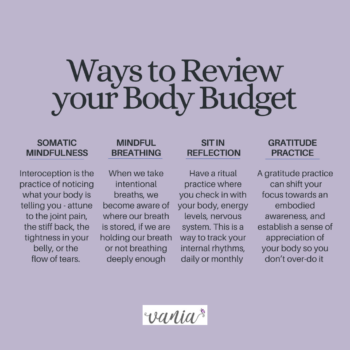
This is a way to have a mind-body connection to allostasis, and to track our expenses (energy out) with our assets (ways to care for body) so that we have enough in the bank.
I know it’s a bit of a masculine way of tending to our energy levels, this talking like we are money. I see it as reclaiming our abundance, worth, and creating balance. I appreciate that there is a place for healthy masculine energy, and this is where being organized, tracking our energy, and using our cognitive strengths is helpful. Consider how you might put a deposit for your body.
Here are some of my deposits.
1) Take Time Alone
In her soul nourishing book, Gift from the Sea, Anne Morrow Lindburgh shares that “every person, especially every woman, should be alone sometime during the year, some part of each week and each day. How revolutionary this sounds, and how impossible of attainment. To many women such a program seems quite out of reach.”
“Woman need to be alone, to have solitude in order to find again the true essence of themselves.” Here she continues to highlight that the stilling of the SOUL is what matters, not just the activities of the mind or body. It’s not enough to not do things and merely be, what is transformative is the nourishment the soul receives by this stillness.
Lindburgh wrote this book in the 1950s. This truth is no less necessary now.
Another important book that was transformative for me was Rest is Resistence by Tricia Hersey. In it, she encourages us to take time to pause, to dream and rest. This is on its own important. And yet, we underestimate its worth: This time of rest becomes a reset and allows for casting a vision of growth and new dreams, a way to evolve and not remain stuck. Sometimes the boundary we need to set is to say no to more (paid) work that becomes priroitized over the delicious dream seed planted like creative projects that align with your future.
How might you take time for yourself – to dream, to rest, to create, to be?
2) Embody your Experience
We need to recognize those early cues of being tired and fatigue. So many of us override these body messages.
There has been a lot of talk about ’embodiment.’ But what does it really mean? I love how Niva Piran put together these 5 principles, from her own work with body image and eating disorders. If you want to read further about them, here is a great article that unpacks them a bit more.
5 Principles of Experiencing Embodiment:
*Body Subjectivity and Resisting Objectification
*Attuned Self-Care
*Experience and Expression of Desire
*Bodily Agency and Functionality
*Body Comfort and Connection
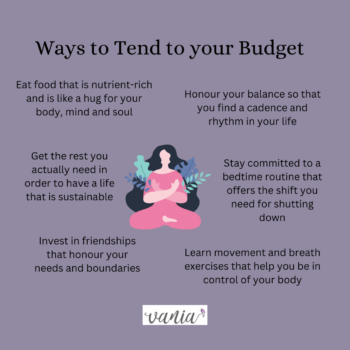
3) Get Lost in a Story
I had a realization recently about why I love reading so much: it is the antidote to my work. As a therapist, I’m also in the origin story or beginning chapters of someone’s life. It’s rare for me to get to the end of their story. It is also such a gift when I do. And, it is ultimately the time in solitude i get – even when escaping into the narrative of the characters or surrounded by people beside me as i read.
When i go on vacation, i read stories with a beginning, middle and end and my friend (who is an editor) shared that she needs quite the opposite – to not read or absorb any narratives. Both of us are practicing self-care, but in our own unique way. That’s why self-care can’t be prescribed. It needs to be embodied and a direct mirror to the need within us.
Books and narratives give me that balance. And that is what self-care and stress management is meant to do – give us balance. Athletes rest their bodies – I get to indulge in a full story, complete with an epilogue!
4) Practice Ritual
Earlier this year, i pulled the Empress card at a Tarot reading. She is the embodiment of rest and self-care. I have also been in communion with the goddess Aphrodite, who symbolizes pleasure and self-love. When i honour rituals that hold these reminders, i remember all over again that we are meant to love ourselves, and to receive care as much as give it to others.
One powerful way to do this is with ritual. Rituals help the soul catch up and integrate through the body the work or info we receive to master our inner knowing, to be closer to divine spirit and full being. It can be as simple as a sacred morning practice, or a ritual bath, or maybe a Sunday afternoon cup of tea and journal session.
Self-care has a role, but is not the answer. The degree it can help you is in the proportion to how much the need is to alleviate the hurt being done. Burnout comes from a push for perfectionism, toxic productivity and poor boundaries. Self-care that is prescriptive doesn’t heal the deeper wounds. This is why ritual is more than just a routine, but rather an attuned and intentional practice that calls for our presence.
We need to listen to the soft cries of our body when it knows we are running on empty.
5) Be in Relationship with Nature
I heard of a concept years ago that has stayed with me since. It goes something like this: Make sure you spend time with nature every day, give or take 20 minutes. When you are stressed or busy, make sure you spend at least an hour outside. I may not have the numbers right, but the point is to ensure you are in relationship with nature EVEN LONGER when life feels full and busy to no end. This is not to add more burden on you (even if it does). Rather, it’s to resource you and help you come back to your body, your breath, and your here and now experience.
We need to choose presence over productivity.
Not only does not help us regulate, by in fact co-regulating with us. It also reminds us that nature is moving forward in a spiral. It is not linear but it is inevitable. Winter still comes and the dark growth in soil happens regardless. Spring flowers still bloom again.
We are nature.
6) Find your Community
Let us embrace the great wisdom of mirror neurons. They show us that we are not only social creatures but also feel inspired and motivated by each other. When we start to practice life in a more sustainable, loving, and kind way, others will also mirror this back.
“The secret to avoiding burnout? Surround yourself with people who aren’t frightened, confused or threatened by your big dreams. Life is too short to talk about the weather, what sport we watched the night before and how work sucks. Have bigger, dreamier more expansive conversations that light you up. That bring out the child-like excitement and curiousity. I honestly think that’s one of the big secrets to avoiding burnout.” Erin Bowe
Let us be in right relationship with others, and embrace the soft strength of connection and attunement. When we add competition to the soup of productivity, it should surprise no one that we end up never satisfied.
7) Let Hustle Culture Die
It’s time to let hustle culture die away as a forgotten misstep. As we enter the dark months of this year, let us remember that this is the year of Soft Strength. As we start to turn towards the next year, what do you want to let die? What internlized hustle or work ethic has run its course?
If you need any more inspiration, let me be the first to tell you that next year is held by The Hermit in Tarot – the 9th card in the major arcana story urges us to become hermits, to turn inward and rest, to find our inner caves and just let the work fall away.
“But this hustle culture mindset fosters unhealthy perfectionism, overcommitting, insecurity, self-neglect, and isolation. Even our proudest achievements cease to have any meaning for us; they’re simply a row of checkmarks on a never-ending list, a line of stepping stones toward a destination we will never reach.” These reflections come from Israa Nasir, who wrote a new book called Toxic Productivity. She goes on to share that the antidote is not to be unproductive at all. Rather, it’s about ensuring that our goals are balanced and includes our personal growth instead of competing with others. The work becomes sustainable and has scaffolding that ensures we don’t forget our own values nor burn out.
8) Be Aligned with your Values
It’s time to reframe away from the story that our value is connected to production and more more more. We don’t in fact have to see more clients to be good at what we do. We don’t have to volunteer in any place, let alone 3 different charities that don’t appreciate our free labour. We don’t have to read all the books and work on social media (again for free) just to have a big following.
Our personal value has become measured not by what we’ve produced already, but by how today’s production can help us produce tomorrow. That keeps us doing doing doing, at our own expense (there’s that word sneaking in again). We are also judging our success by how tired we are – the more exhausted has become the goal.
Come back to what you value. What is it that lights your inner spark. It’s absolutely good to want to volunteer and be an active member of your community. What is also important is that you are not running yourself on empty to do so. What is your soul’s code and service to the world is important, and so is how you live your life. Does it include pleasure and rest, time for yourself and your loved ones?
9) Reframe How you Talk to Yourself
A pesky inner voice (my Bank Manager Part) urges me to hustle. “But as some of us reach adulthood, these lofty goals tend to boil down to a single, urgent imperative: in order to have value, we have to produce more value. Israa Nasir
When i take time to notice that is not only NOT my voice, it is a voice that forgets that my worth is inherent because i exist and rest is not just resistance but also a paramount need.
I already knew i was in mid-life, and now i know that i’m even closer to a more formal marker of it. I’ve reached my Fuck It Era – and it’s quite close friends with The Hermit.

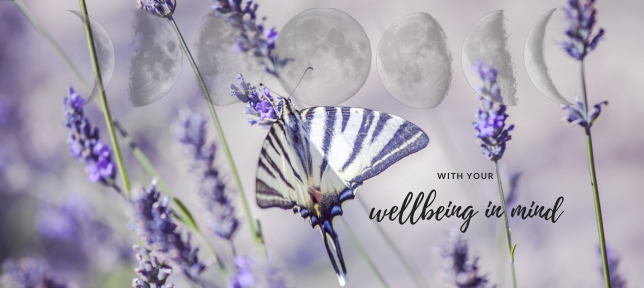
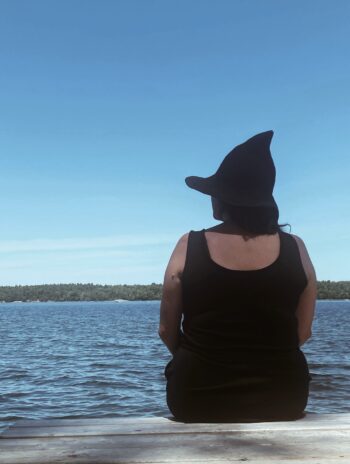 First of all, self-care isn’t about self-regulating or soothing ourselves. It’s actually about enhancing our life by giving ourselves the same care we give others. And I think it can be especially hard for those socialized as women or carers of others.
First of all, self-care isn’t about self-regulating or soothing ourselves. It’s actually about enhancing our life by giving ourselves the same care we give others. And I think it can be especially hard for those socialized as women or carers of others.